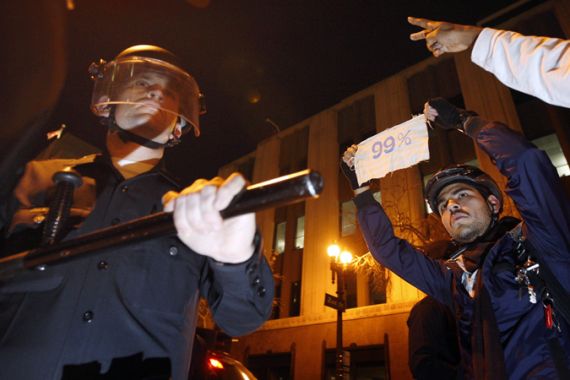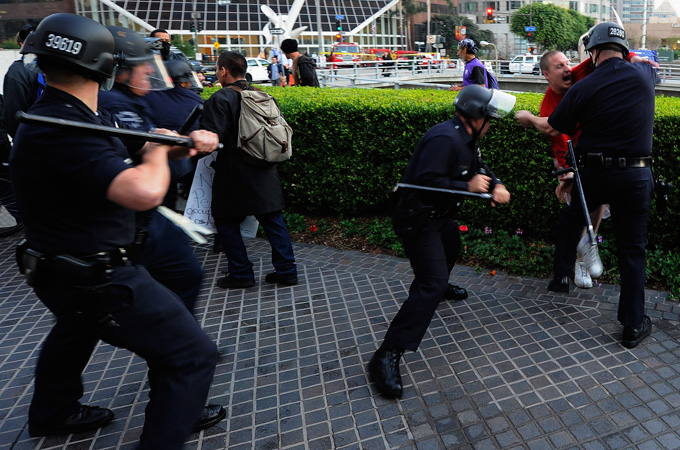Why Naomi Wolf got it wrong
In the US, political repression – such as the crackdown on Occupy protests – doesn’t require top-down coordination.

 |
| Police crackdowns on ‘Occupy’ protests tend to be locally organised, not directed at a national level [GALLO/GETTY] |
On Friday, Naomi Wolf made the attention-grabbing accusation in the Guardian that federal officials were involved in, indeed ordered, the violent crackdowns against Occupy Wall Street protesters that we’ve been seeing across the country these past few weeks.
Congressional overseers, with the blessing of the White House, told the DHS [Department of Homeland Security] to authorise mayors to order their police forces – pumped up with millions of dollars of hardware and training from the DHS – to make war on peaceful citizens.
The next day, Joshua Holland debunked Wolf’s claims on Alternet.
I don’t have much to add to Holland’s critique. Wolf gets many of her facts wrong, and Holland shows it.
The problem, though, is bigger than that: The reason Wolf gets her facts wrong is that she’s got her theory wrong. And while many were quick to jump off her conspiracy bandwagon once Holland pointed out its flaws, I suspect that one of the reasons they were so quick to jump on it in the first place is that they subscribe to her theory.
We still don’t have nearly all the who-what-when-where-why-and-how of the crackdowns – and there’s certainly nothing wrong with raising questions, pursuing leads, and investigating claims regarding the involvement of the feds – but the quickness and ease with which Wolf reached for the top-down conspiratorial national government story, well in advance of the facts we know, provides us with a teachable moment of how many tend to think about political repression in the United States, and how we might think about it instead.
Like many critics of state coercion in the United States, Wolf seems to assume that political repression requires or entails national coordination and centralised direction from the feds. This fits with a larger tradition in the United States that sees centralised and national power as the handmaiden of tyranny, and local power as its antidote. Throughout much of the twentieth century, that was the argument of conservatives, who opposed federal involvement in such “local” matters as Jim Crow. But since the 1980s, that position has steadily migrated to the left as well.
Whatever its political provenance, however, the problem with that position – as I argued in this piece in the Boston Review in 2005, and in a much longer piece in the Missouri Law Review [pdf] – is that it’s wrong.
From the battles over abolition to the labor wars at the turn of the last century; from the Red Squads of the twentieth-century police departments to the struggles over Jim Crow; state repression in the US has often been decentralised, displaying that very same can-do spirit of local initiative that has been celebrated by everyone from Alexis de Tocqueville to Robert Putnam. Though Tocqueville and Putnam were talking, of course, about things like creating churches and buildings roads, the fact is: If the locals can build a church or a road on their own, they can also get rid of dissenters on their own, too, no?
Even where there has been coordination and involvement from above, as in the epic cases of the Red Scare, McCarthyism, COINTELPRO, or now the War on Terror, what’s been most striking is how local police and officials have managed to manipulate that federal involvement to their own ends. As I wrote in the Boston Review:
What history demonstrates is that police officers often use their powers, with or without federal prompting, as instruments of larger political purpose. The danger of cooperation between federal agencies and local police is not that the former will conscript the latter into repressive programs the latter would not otherwise pursue, but that it allows the police to apply the legitimising gloss of national security to their own pet projects of repression. During the McCarthy era, for example, southern politicians and law-enforcement officers used the language of anti-communism to outlaw the NAACP and to arrest and indict civil-rights leaders for sedition. In the Denver case already mentioned, the police used the rubric of domestic security to keep track of not only the groups cited above but also a local organization working against police brutality in the city. This past summer, during the Republican Party convention in New York City, the NYPD preemptively arrested more than 1,500 protesters – some of them obstreperous, virtually all of them nonviolent – as well as innocent bystanders. How did the mayor justify the arrest and prolonged detainment of these individuals? By drawing parallels, according to The New York Times, “between verbally abusive demonstrators and the Sept. 11 terrorists.”
If all politics is local in the United States, as former Speaker of the House Tip O’Neill reminded us, it stands to reason that a good deal of the political repression is as well.
It’s hard for Americans to be clear about this, and probably harder for non-Americans, especially Europeans, who were among Wolf’s readers in the Guardian, and have very different traditions and policies in their countries. As my friend and colleague Alex Vitale – a professor at Brooklyn College and one of the country’s leading experts on policing practices – reminded me:
The US is somewhat unique in how decentralised it is in terms of both policing and politics. In much of Europe you’re dealing with national police forces and national political parties that have real influence over local mayors – neither of which is true in the US. Local police in the US will take resources from the center and at times advice and even some coordination, but they are generally loath to give up any real autonomy. And they are quite capable of coming up with their own harebrained initiatives based on primarily very local politics. Much of the Oakland crackdown came in the wake of pressure from local business improvement associations that had little to do with national politics.
It’s not surprising that, faced with the crackdown on Occupy protests, Wolf would immediately turn to a theory of national, centralised repression. It’s part of our national DNA, on the left and the right, to assume that tyranny works that way. We’ve inherited a theory that holds, in the approving words of the Yale constitutional law scholar Akhil Reed Amar, that “liberty and localism work together”. Nothing, as Holland so ably if inadvertently demonstrates in his demolition of Wolf, could be further from the truth.
Corey Robin teaches political science at Brooklyn College and the CUNY Graduate Center. He is the author of The Reactionary Mind: Conservatism from Edmund Burke to Sarah Palin and Fear: The History of a Political Idea. His articles have appeared in the New York Times, Harper’s, the London Review of Books, and elsewhere. He received his PhD from Yale and his A.B. from Princeton. You can read Corey’s blog here and follow him on Twitter @CoreyRobin.
The views expressed in this article are the author’s own and do not necessarily represent Al Jazeera’s editorial policy.
